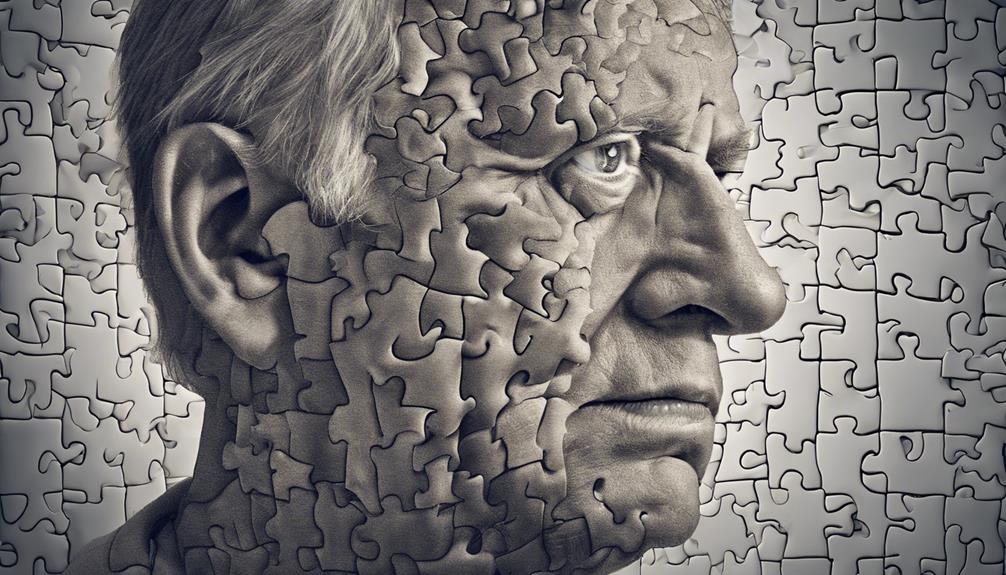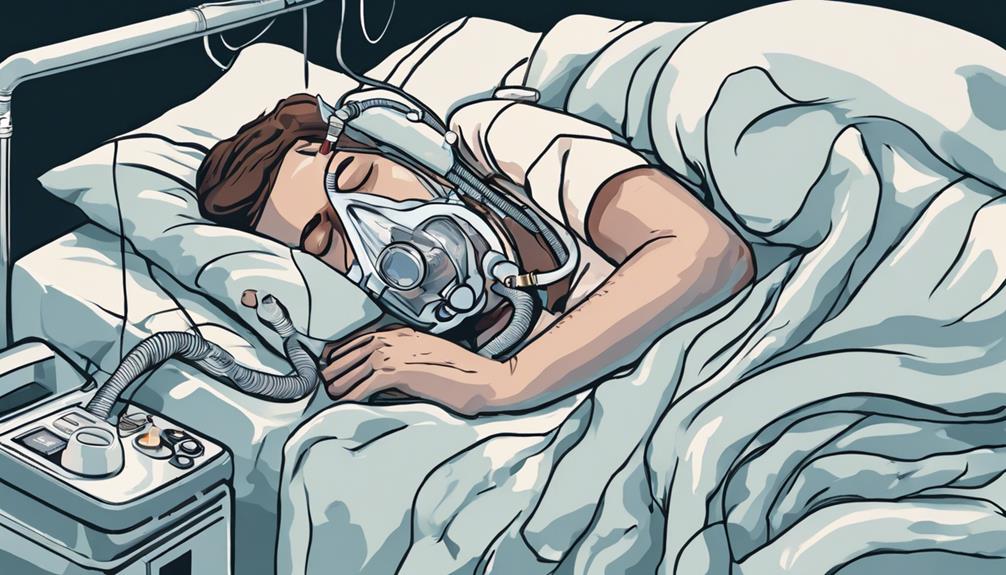Anxiety may indicate early warning signs, particularly involving memory and cognitive abilities, such as in cases of Alzheimer’s disease. Common indications of anxiety include fretfulness, uneasiness, and difficulty focusing. Watch for behaviors like hoarding and fear of solitude. Elements like health concerns and stress can provoke anxiety. Anxiety can accelerate memory decline and potentially progress to dementia. Mood changes and irritability are important symptoms to observe. For further insights on how anxiety impacts cognitive deterioration and brain health, stay tuned.
Key Takeaways
- Anxiety is the third most common symptom in Alzheimer's, affecting 40% of patients.
- Excessive worry, restlessness, and forgetfulness are early signs of both anxiety and Alzheimer's.
- Anxiety can signal cognitive decline and rapid memory deterioration.
- Mood swings and irritability precede significant memory loss in anxiety and Alzheimer's.
- Anxiety accelerates cognitive decline, impacting memory deficits and cognitive impairment.
Anxiety and Cognitive Decline Relationship
We've found that anxiety greatly impacts cognitive decline in individuals with Alzheimer's disease. Anxiety, the third most common neuropsychiatric symptom in Alzheimer's, affects around 40% of patients. This emotional distress can exacerbate cognitive deficits, leading to memory loss and worsening of symptoms.
Studies indicate that anxiety isn't just a byproduct but an essential risk factor for Alzheimer's, potentially signaling the onset of cognitive decline. Elevated anxiety levels are particularly concerning as they're associated with rapid memory deterioration and can expedite the progression from mild cognitive impairment to dementia.
Furthermore, anxiety in Alzheimer's is linked to specific neuropathological changes, such as early neurofibrillary tangle pathology in the entorhinal region and white matter hyperintensities that suggest a potential vascular component. Understanding the relationship between anxiety and cognitive decline is vital in managing the condition effectively.
Early Signs of Anxiety Disorders

Anxiety disorders can show various signs like excessive worry, restlessness, and difficulty concentrating. These symptoms can differ from person to person but are vital to identify early.
Recognizing these signs and seeking help can lead to effective management and improved quality of life.
Anxiety Symptoms Overview
Often overlooked, the early signs of anxiety disorders can manifest in various ways, including fatigue, irritability, and physical symptoms like palpitations, especially in individuals with Alzheimer's disease. Hoarding behavior, fear of being alone, and following family members are common signs of anxiety in those with Alzheimer's.
Triggers for anxiety in Alzheimer's can range from health concerns and financial issues to stress, pain, or exhaustion. Damage to brain areas involved in emotions can contribute to the development of anxiety symptoms in Alzheimer's disease. Excessive caffeine or alcohol consumption can worsen anxiety symptoms in individuals with Alzheimer's.
It's important to recognize these signs early to provide appropriate support and care for individuals experiencing anxiety alongside Alzheimer's disease.
Recognizing Anxiety Early
Understanding the subtle behavioral shifts accompanying early anxiety manifestations in individuals with Alzheimer's can greatly impact their overall well-being and care management. Recognizing anxiety early is vital as it can exacerbate cognitive deficits and affect the quality of life for both patients and caregivers. Here is a table highlighting some common early signs of anxiety disorders in Alzheimer's:
| Early Signs of Anxiety in Alzheimer's |
|---|
| Fatigue |
| Insecurity |
| Irritability |
| Palpitations |
| Agitation |
| Questioning |
| Restlessness |
| Hoarding behavior |
| Fear of being alone |
Recognizing these signs promptly enables effective management and interventions, ultimately improving the well-being of individuals with Alzheimer's and those caring for them.
Behavioral Changes and Memory Loss
As we explore behavioral changes and memory loss in anxiety and Alzheimer's, we notice mood swings becoming more frequent and forgetfulness starting to stand out.
These signs can indicate underlying issues that need attention. Addressing these changes early on is crucial for managing anxiety and Alzheimer's effectively.
Mood Swings Observed
Behavioral changes, particularly mood swings like irritability and agitation, are key indicators of anxiety in individuals with Alzheimer's disease. These mood swings can manifest as restlessness and emotional lability, often appearing before significant memory loss.
When caring for someone with Alzheimer's, noticing shifts in mood such as increased fearfulness or clinginess can provide insights into their emotional well-being. Mood swings and emotional instability not only affect the individual with Alzheimer's but also impact their caregivers.
Addressing these mood swings early on is essential for managing anxiety symptoms and enhancing the overall quality of life for those living with Alzheimer's. By recognizing and responding to these behavioral symptoms, we can better support individuals facing the challenges of anxiety and Alzheimer's disease.
Forgetfulness Becoming Prominent
Noticing an increasing tendency to forget recent events or important details can signal the emergence of memory-related issues in individuals, possibly indicating the presence of anxiety or early stages of Alzheimer's disease.
Forgetfulness becoming significant is a common early sign of both anxiety and Alzheimer's disease. Memory loss, particularly forgetting recent events or vital information, can be a key behavioral change linked to the progression of these conditions.
If you or someone you know is experiencing increased forgetfulness, it's crucial to consult a healthcare professional for evaluation. Monitoring memory lapses and seeking timely assessment can help in the early detection and management of anxiety and Alzheimer's.
Anxiety as an Early Indicator

Anxiety serves as an important early indicator of potential cognitive decline linked to Alzheimer's disease. Here are four key points to help us understand the significance of anxiety in predicting Alzheimer's:
- Anxiety can signal cognitive decline: Elevated anxiety levels have been linked to a higher risk of rapid memory decline, indicating a potential connection to Alzheimer's disease.
- Anxiety in mild cognitive impairment (MCI): The presence of anxiety in individuals with MCI can increase the chances of progressing to dementia, underlining the importance of addressing anxiety symptoms early on.
- Association with Alzheimer's pathology: Anxiety is associated with positive amyloid PET scans and the presence of neurofibrillary tangles, which are key indicators of Alzheimer's pathology, suggesting a potential link between anxiety and the development of the disease.
- Anxiety as a prelude to Alzheimer's: Research suggests that anxiety in individuals with Alzheimer's may precede the onset of the disease, emphasizing the role of anxiety as an early warning sign for cognitive decline associated with Alzheimer's.
Cognitive Decline in Anxiety Patients

Experiencing anxiety has been shown to accelerate cognitive decline in patients, highlighting the detrimental impact of this mental health condition on cognitive function. When individuals struggle with anxiety, their cognitive abilities may deteriorate at a faster rate than those without anxiety. This decline in cognitive function can manifest as memory deficits and overall cognitive impairment, affecting daily activities and quality of life.
| Cognitive Decline | Anxiety | Alzheimer's Disease |
|---|---|---|
| Faster progression | Increased risk | Linked to anxiety |
| Memory deficits | Elevated levels | Worse outcomes |
| Cognitive impairment | Early indicator | Poor cognitive outcomes |
Understanding the relationship between anxiety and cognitive decline is essential for providing support to those experiencing these challenges. By recognizing anxiety as a potential early indicator of worse cognitive outcomes, steps can be taken to address both mental health concerns and cognitive well-being.
Detecting Anxiety-Related Memory Issues

As we explore the impact of anxiety on cognitive function in individuals with Alzheimer's, an important aspect to ponder is detecting anxiety-related memory issues. These memory problems can manifest in various ways, affecting daily life and overall well-being. Here are four key points to ponder:
- Difficulty recalling recent events or conversations may be a sign of anxiety-related memory issues in Alzheimer's.
- Struggling to remember appointments or important dates could be a result of anxiety complicating memory functions.
- Memory lapses, such as forgetting instructions or having trouble completing tasks, might be exacerbated by anxiety in Alzheimer's patients.
- Confusion about time, location, or people could stem from anxiety-related memory problems, leading to further challenges in cognitive function.
Recognizing these signs early on is essential for providing appropriate support and interventions to help individuals manage their anxiety-related memory issues effectively.
Anxietys Influence on Brain Health

Through its association with positive amyloid scans and neurofibrillary tangles in Alzheimer's disease, anxiety reveals a compelling link to underlying neuropathology. Studies suggest that anxiety not only affects our mental state but can also impact brain health. In Alzheimer's disease, anxiety is considered an essential risk factor and may even act as a prodromal symptom, indicating early stages of the disease. This connection is further reinforced by the presence of neurofibrillary tangles in the brain, particularly in the entorhinal region, a key area affected by Alzheimer's progression.
Moreover, elevated levels of anxiety have been shown to accelerate memory decline in individuals with Alzheimer's disease, highlighting the significant role anxiety plays in cognitive function. Managing anxiety effectively is vital for maintaining brain health and enhancing quality of life for both patients and caregivers. Addressing triggers, providing support, and exploring non-pharmacological techniques are critical steps in improving overall well-being in those affected by Alzheimer's disease and anxiety.
Identifying Cognitive Impairment Early

Understanding the early indicators of cognitive impairment is key in recognizing potential Alzheimer's disease progression. When it comes to identifying cognitive impairment early, there are a few essential points to keep in mind: One of the most crucial aspects is observing changes in memory, particularly short-term memory, which may subtly worsen over time. In addition, difficulties with problem-solving or completing familiar tasks can also be early signs of dementia. Recognizing these changes and seeking professional evaluation early on can significantly impact the management and potential progression of Alzheimer’s disease.
- Memory Problems: Pay close attention to any noticeable short-term memory loss, as this is often one of the initial signs of cognitive decline.
- Early Signs: Look out for trouble finding words, getting lost in familiar places, or changes in behavior or mood, as these could indicate cognitive impairment.
- Medical Evaluation: Seeking a medical evaluation for any cognitive changes is essential. This can help differentiate between normal aging and potential Alzheimer's disease, guiding appropriate interventions.
- Timely Interventions and Management Strategies: Early detection allows for timely interventions and the implementation of management strategies. These interventions can help slow down the progression of cognitive decline and improve the quality of life for individuals experiencing Alzheimer's or other forms of cognitive impairment.
Anxiety Management in Alzheimers

Effective management of anxiety in Alzheimer's disease involves utilizing a combination of reassurance, support, and limited pharmacotherapy to enhance the quality of life for patients and well-being for caregivers. Anxiety is prevalent in Alzheimer's disease, affecting around 40% of individuals with AD, making its management vital.
Non-pharmacological techniques such as engaging in visual arts, music, exercise, and aromatherapy have shown to be beneficial in reducing anxiety symptoms in individuals with AD. Additionally, cognitive intervention therapy, like cognitive rehabilitation, can help alleviate anxiety in mild cognitive impairment (MCI) or the early stages of dementia.
Managing anxiety in Alzheimer's disease is essential as it can exacerbate cognitive deficits, interact with amyloid status, and even predict faster cognitive decline. By incorporating these strategies into the care plan for individuals with Alzheimer's, caregivers and healthcare providers can work together to improve the overall well-being and quality of life for those affected by this challenging disease.
Frequently Asked Questions
What Stage of Dementia Is Anxiety?
Anxiety can manifest at any stage of dementia, impacting individuals' quality of life. We provide reassurance, support, and limited medication to manage anxiety effectively. It's essential to address these concerns promptly to enhance overall well-being.
How Can You Tell the Difference Between Dementia and Anxiety?
We differentiate dementia and anxiety by observing cognitive functions for dementia and emotional responses for anxiety. Seeking medical help is crucial for accurate diagnosis. Early identification leads to better management and quality of life.
Is There a Link Between Alzheimer's and Anxiety?
Yes, there is a link between Alzheimer's and anxiety. Studies show anxiety can be an independent risk factor for Alzheimer's and may worsen cognitive deficits. Effective management involves non-pharmacological techniques and cognitive intervention therapy to improve quality of life.
Is Anxiety an Early Indicator of Dementia?
Yes, anxiety can serve as an early indicator of dementia. Elevated anxiety levels are linked to rapid memory decline and increased dementia conversion rates. Managing anxiety in early stages of Alzheimer's is paramount for patient well-being.
Conclusion
To sum up, it's crucial to recognize the early signs of anxiety and cognitive decline, as they may be interconnected.
By understanding how anxiety can affect memory and brain health, we can better detect and manage potential issues like Alzheimer's disease.
Remember, knowledge is power, and being proactive about mental health can make a significant difference in the long run.
Stay informed, stay vigilant, and take care of your mind like you'd your body.









